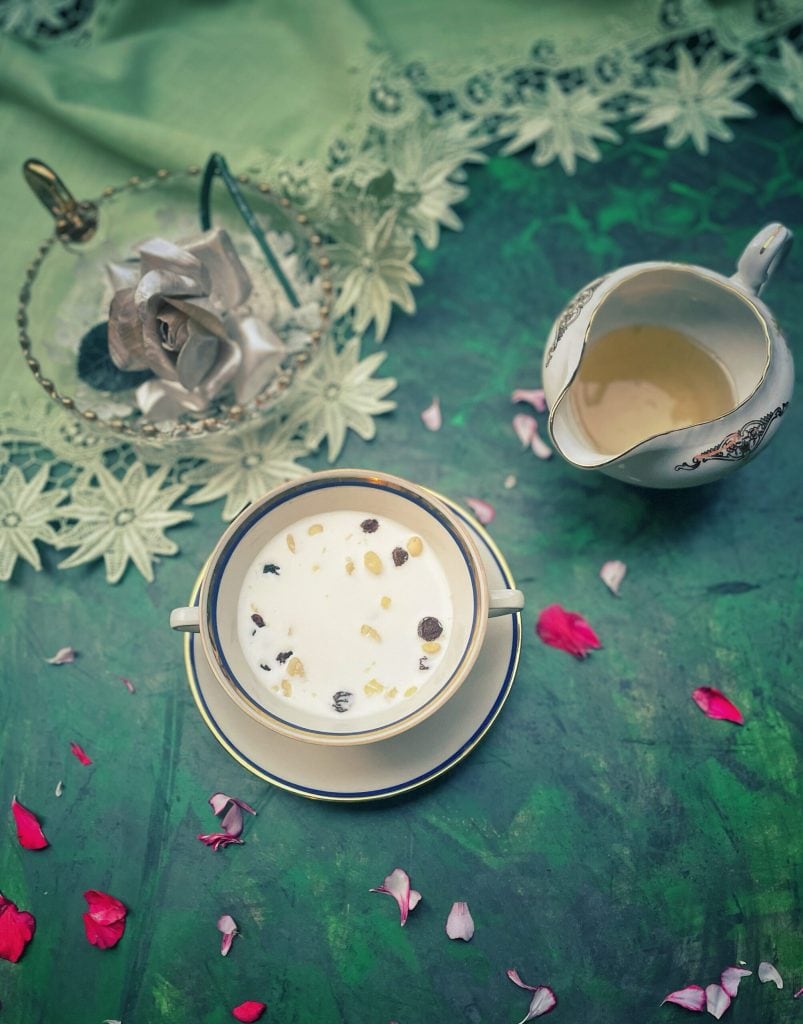The Ashtalieh (أشتاليه) is a traditional Lebanese dessert based on ashta, a cream made of milk, starch, and orange blossom or rose water.
➡The name Ashtalieh derives from “ashta”—a symbol of wealth and abundance in Middle Eastern cuisines.
Originally, ashta was made without starch, only with fresh milk and time to allow the fat to rise.
With the advent of faster methods, it began to be thickened with cornstarch or rice flour, perfumed with orange blossom or rose water.
➡It was traditionally served in noble houses or during special occasions, such as weddings and religious holidays, especially during Ramadan.
➡It spread mainly among Lebanon, Syria, and Palestine, but with variations also in Egypt and Jordan.
➡Usually served with a light fragrant sugar syrup, called “atar” or “qater.”
Another recipe on the blog based on ashta:

- Difficulty: Very Easy
- Cost: Economical
- Preparation time: 5 Minutes
- Cooking methods: Stovetop
- Cuisine: Middle Eastern
- Seasonality: All Seasons, Ramadan
Ingredients
- 2.1 oz starch
- 4.2 cups milk
- 3.5 oz sugar
- 2 tablespoons orange blossom essence (or rose water)
- to taste chopped pistachios (or raisins)
- 5.3 oz sugar
- 2.5 fl oz water
- 1 teaspoon lemon juice
- 1 teaspoon orange blossom essence (or rose water)
Steps
Dissolve the cornstarch in a small amount of cold milk (about 3.4 fl oz).
In a saucepan, heat the rest of the milk with the sugar.
When the milk is hot but not yet boiling, slowly add the dissolved starch, stirring constantly with a whisk.
Continue stirring until the cream thickens (it will take about 10 minutes).
Remove from heat and add the orange blossom or rose water.
Pour into cups or dishes and let cool.
Once cooled, garnish with ashta and chopped pistachios.
Bring sugar and water to a boil.
Add lemon juice and let it simmer for 7-10 minutes until it slightly thickens.
Turn off the heat and add the orange blossom or rose water.
Let it cool completely before pouring over the ashtalieh when serving.
FAQ
What are the differences between Ashtalieh and other Lebanese desserts like Layali Lubnan or Mhallabiyeh?
Here is a comparison between Ashtalieh, Layali Lubnan, and Mhallabiyeh, all spoon desserts very popular in Lebanese cuisine:
Ashtalieh (أشتاليه)
Texture: creamy and velvety
Base: milk + cream + starch (sometimes with fresh ashta or light cheese)
Aroma: orange blossom water / rose water
Decoration: chopped nuts, sometimes with sugar syrup (atar)
When served: special occasions, banquets, Ramadan
Notes: richer and more substantial, considered refined and “luxurious”
Layali Lubnan (ليالي لبنان – Nights of Lebanon)
Texture: layered – creamy base and whipped cream topping
Base: semolina cooked in milk (or cream)
Aroma: rose water / orange blossom water
Decoration: whipped cream, chopped pistachios, sometimes honey or syrup
When served: homemade or reception dessert
Notes: more “rustic” and hearty, but elegant, often considered the popular version of Ashtalieh
Mhallabiyeh (مهلبية)
Texture: smoother, similar to pudding
Base: only milk + starch + sugar
Aroma: simple, with orange blossom or rose water
Decoration: nuts or cinnamon
When served: everyday dessert or for children
Notes: the simplest of the three, widespread throughout the Middle East
Conclusion
Mhallabiyeh → the most basic
Layali Lubnan → layered and fluffy
Ashtalieh → the richest and “regal”Are Ashta and Ashtalieh the same thing?
Ashta and Ashtalieh are not exactly the same, but they are closely related:
Ashta is a thick cream made from milk, used as a filling or accompaniment in many Middle Eastern desserts (like qatayef, knefeh, ma’amoul bil ashta…). It is similar to clotted cream or a very simple custard, often made with milk, starch, and fragrant water.
Ashtalieh is a traditional Lebanese dessert where ashta is the main ingredient, but it is served as a standalone dish, cold and decorated (usually with nuts and a sugar syrup). It is thus a finished sweet preparation, while ashta serves as a base or filling.
Ashta = cream
Ashtalieh = dessert based on that cream
Somewhat like the difference between chantilly cream and a mille-feuille with chantilly.

